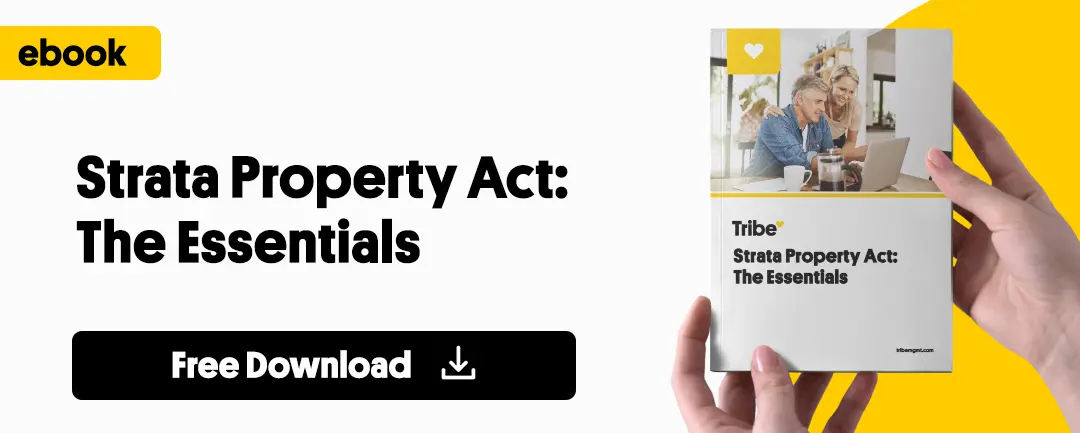
Strata Bylaws in BC: An Overview for Councils and Owners
“Pets must not exceed 50 lbs.”
“Playing ‘Never Gonna Give You Up’ by Rick Astley on repeat at 2 in the morning is strictly prohibited.”
Ok, that last one isn’t an actual Strata Bylaw in BC. But Owners or tenants in Strata Corporations might often read Strata Bylaws as just a long list of restrictions about what they can and can’t do in their homes. However, when properly written and enforced, they’re meant to protect your Strata Corporation, as well as all Owners and Tenants.
Strata Bylaws outline the rights and responsibilities of Owners and Residents in the Strata Corporation, which consists of the strata lots, common property and common assets.
As seasoned experts in condo living, we’re here to break down Strata Bylaws in BC for Councils, Owners and Residents.
Share this resource with a fellow Council Member or Neighbour!
Table of Contents
Standard Strata Bylaws in BC
Every Strata Corporation starts with a set of standard strata bylaws, which are directly taken from the Strata Property Act Standard Bylaws. Under Section 120 of the Strata Property Act:
"The bylaws of the strata corporation are the Standard Bylaws except to the extent that different bylaws are filed in the land title office".
In plain language, your Strata Corporation is using the provincial standards, unless otherwise revised by a ¾ vote by the Owners of a resolution at an Annual or Special General Meeting.
Let’s take a walk through the steps of why a strata bylaw might be amended, and how to make any changes official.
Amending Bylaws:
Rarely will a Strata Corporation have a set of Standard Bylaws that hasn’t been amended in any way.
Some standard bylaws, such as payment of strata fees, will always remain in place. However, some often see change. For example, the standard “Obtain approval before altering a strata lot” is often amended to include specifications and requirements for any alterations, such as flooring thickness or hours of permitted construction.
There are three types of amendments that can be made to strata bylaws:
- Change a current bylaw,
- Create a new bylaw, or
- Delete a current bylaw (And no, you can’t delete all the bylaws: BC is the West Coast, not the Wild, Wild West, after all)
Once a Strata Corporation, if it is 100% residential, is past its second Annual General Meeting (AGM), any bylaw amendment resolution must be presented at an AGM or SGM and must pass with a ¾ vote.
A Strata Council considering bylaw amendments should obtain legal advice, and while ideally they are already aligned with the needs of their community, holding a “Town Hall” style meeting (an informal gathering of Owners and Residents) could also help them determine the Strata Corporation’s sentiments on any proposed bylaw amendments.
Enforcing Bylaws:
Enforcing bylaws can be a delicate process. After all, people who might violate Strata Bylaws aren’t random strangers on the street that you’ll never see again: these are neighbours, people one might see often and hope to live peacefully with.
If any bylaw amendments are approved as outlined above, they're unenforceable until a Form I is filed at the Land Title Office.
We wish that a Form I could be a cool thing for us to explain - but it really is just a Form, signed by two members of the Strata Council. As boring as that might sound though, its proper filing is crucial to enforcing bylaws.
For the Strata Council to enforce bylaws, all involved parties must take specific steps:
- First, the Strata Corporation must receive a complaint from an Owner or Resident.
- Then, the Strata Council must give the alleged offender written notice of the complaint.
- The alleged offender is given a reasonable opportunity and time frame to respond to the complaint, as they have the right to request a hearing under Section 135 of the Strata Property Act.
It is at the discretion of the Strata Council to determine if a bylaw has been broken, and if so, must also decide how to enforce it. A common fine is $200, although for certain cases (such as illegal short-term rentals), fines can be as high as $1,000 a day.
Unenforceable Strata Bylaws
It should be noted that any Strata Bylaws that contravene the Strata Property Act, Human Rights Code or other legislation will be unenforceable. In most cases, working with a knowledgeable Strata Manager can help Councils avoid encountering these issues. But issues do still come up from time to time.
A common issue that shows up in Strata Corporations, for instance, is someone who might need a service animal who lives in a building with a strata bylaw that prohibits dogs. In this case, the Human Rights Code supersedes the bylaw.
The Difference Between Bylaws and Rules:
While the terms “Bylaws” and “Rules” might be used interchangeably, there are some key differences between strata bylaws and rules. Think of Rules like the Bylaw’s little brother.
The Rules of Rules:
- Rules can be created by a Strata Council without the input and consultation of Owners, but for the rule to have continued effect it must be ratified by a majority vote at the next AGM or SGM.
- In the case of a conflict between a rule and a bylaw, the bylaw always supersedes the rule. For example, if the Bylaws indicated one thing about booking an amenity space, but a Rule was recently implemented by a new Council that contradicts that Bylaw.
- Rules can only be created to govern the use of common property and common assets.
- Rules typically have lower fines than bylaws (usually $50 compared to $200).
- A fine cannot be imposed on a rule violation until it has been ratified by a majority vote.
Conclusion:
A well-thought-out set of Strata Bylaws lays the foundation for harmonious community living. Understanding bylaws is an important part of living in a Strata Corporation: they’re meant to provide an administrative framework for the Strata Council while ensuring that all Owners and Residents have the same expectations of what it means to be a part of their strata community.
With the support of a licensed Strata Manager (we might know one or two here at Tribe), we can help Strata Councils navigate bylaws: from enforcement to amendments, we’re here for you.
Share with your neighbours today!



.jpg?width=352&name=Copy%20of%20Blog%20Featured%20Image%20(4).jpg)

